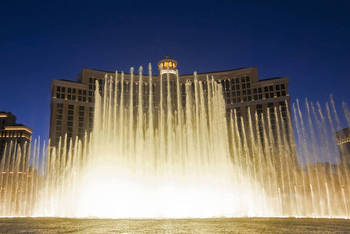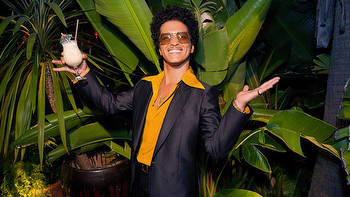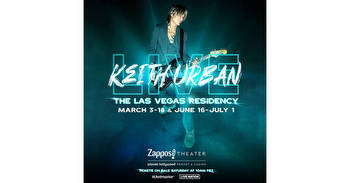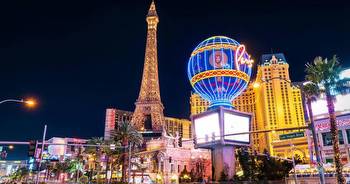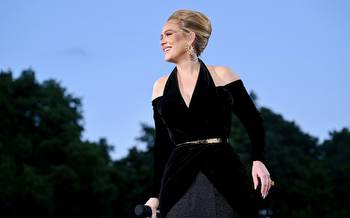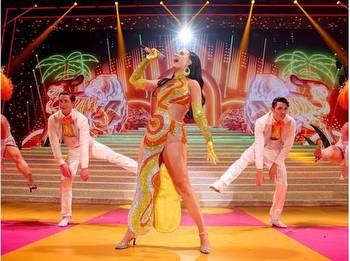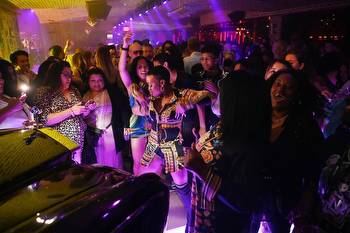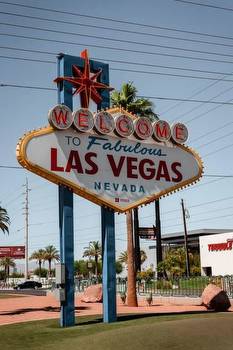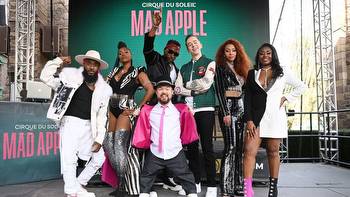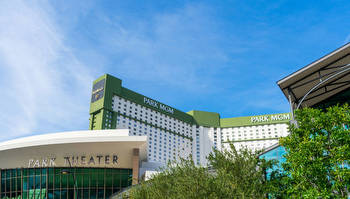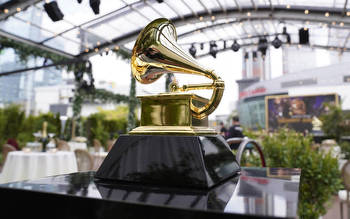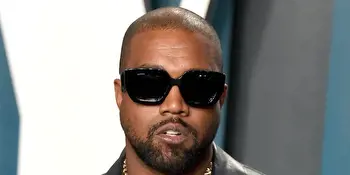Inside the Grammys’ Surreal Vegas Experiment: Review

The entrance of the MGM Grand Garden Arena is surrounded by a maze of slot machines, roulette tables, and cocktail lounges. Year-round, vacationers flock to the flashing lights of video poker machines with hopes of striking it rich, like moths to a flame.
As “jackpot” signs flash overhead and “cha-ching!” sounds fill the air, I’ll admit it’s easy to get caught up in the excitement. Every square inch of the building has been strategically set up to stimulate you, keeping you on the casino floor for as long as possible. By design, even if you’ve already lost thousands of dollars, you’re driven forward by a misguided sense of optimism that your luck will turn around if you just place one
On Sunday night, the MGM Grand was home to an event that similarly lures us in with bright lights and lavish pageantry each year, churning up annual excitement despite its history of disappointment and unfulfilled potential. For the first time in history, the Grammys came to Las Vegas.
The 64 Annual Grammy Awards were initially scheduled to take place on Jan. 31, 2022, at the Crypto.com Arena in Los Angeles, before being rescheduled and relocated due to COVID-19 concerns. Because of the last-minute change of plans, the ceremony and all the accompanying Grammys weekend parties were thrown together in a fraction of the time they usually are.
In some instances, the industry’s party planners rose to the occasion. Events like Warner Music Group’s Sunday night party at the Nomad and Grey Goose’s Sound Sessions party with Tinashe made clever use of their Vegas surroundings. Living up to the hype of the weekend, these were lavish get-togethers that celebrated their artists, executives, and guests in style. At Atlantic Records’ Silk Sonic party on Saturday night, Questlove pulled off a celebratory DJ set that kept going until long after midnight, living up to every idyllic expectation you could possibly have for an extravagant Grammys event. If you ended up at any of these parties, the takeaway was clear: major labels are thriving again (financially) and there’s a lot to celebrate.
There were other moments, though, where the collision of the Grammys and Las Vegas culture was far less seamless. At the Spotify Best New Artist party, Grammys guests shared a space with thousands of Vegas revelers at the Encore Beach Club, creating a hilarious situation where a thin velvet rope was all that separated suit-wearing executives at a “Grammys brunch” from swimwear-clad college kids getting drunk in the pool. There’s nothing that says “Grammys weekend in Vegas” quite like middle-aged industry types attempting to network while shirtless partiers in their 20s fist-pump to David Guetta remixes just a few feet away.
On Sunday evening at the main event, the side effects of last-minute planning were also apparent. A lack of clear signage, coupled with staff members giving conflicting directions, created a chaotic situation where guests wandered around the MGM premises until arriving at the same choke point. Faced with hundreds of angry attendees who had just been denied access to the red carpet, one bewildered staff member apologized and pointed out this is is the kind of thing that happens when a massive event is thrown together in a rush.
Despite the chaos, the Garden Arena did fill up in time for the 5 p.m. ceremony, and those who made it to their seats were treated to a surreal experience. The Grammys is a made-for-TV event, and the whole thing is designed with cameras in mind, so each time the show resumes from commercial break, it’s like a game of “Where’s Waldo?” as you try to figure out which corner of the arena that host Trevor Noah has emerged from. Meanwhile, a booming voice demands audience members to clap and cheer, seconds before each segment begins.
As I watched the Grammys from home all my life, something about the glitzy ceremony never seemed like a tangible event that actually existed in the real world, and even as I sat in the arena and watched with my own two eyes, the feeling oddly persisted.
It’s all worth it, though, to see things that don’t end up getting captured by the television cameras, like Lil Nas X playfully waving at performers during their songs and Doja Cat sprinting across the arena floor to accept her award after a poorly timed bathroom break. During commercial breaks, many of the celebrity guests seated at the front of the stage get up and start talking with each other, leading to world-colliding moments we usually don’t get to see in public (this year, it looked like everyone wanted to meet Jack Harlow).
For as chaotic and over-the-top as this year’s Grammys parties were, the ceremony itself was relatively dull. In the wake of Will Smith’s slap-heard-round-the-world at the Oscars, there was a lack of unexpected moments, and the entire run-of-show seemed to be guided by a “let’s play it safe” philosophy. Outside of a couple exceptions, like Billie Eilish’s lively rendition of “Happier Than Ever,” the performances were mostly forgettable (and occasionally awkward, like Lady Gaga’s Tony Bennett tribute and John Legend’s “prayer for peace,” which felt like a forced attempt to create a *Grammys moment*).
Watching acts like Silk Sonic and Jon Batiste rule the night, it became obvious where the priorities of the Academy stand right now. Artists who tap into nostalgia and traditionalism are rewarded with the most enthusiasm during the televised portion of the night, which is a shame considering how innovative and forward-thinking the rest of the music industry actually is right now. A reflection of the times, the Grammys is not.
The fact that Jon Batiste won Best Album, in a year that was dominated by artists like Olivia Rodrigo, Doja Cat, Tyler, the Ceator, and Kanye West, is a clear indicator that the Academy doesn’t have much interest in rewarding the musicians who are actually moving the people.
Most of the performances, especially in the middle section of the show, were perfectly inoffensive, but also devoid of originality or anything particularly memorable. The show seemed to take cues from the stiff pageantry of traditionalist Las Vegas residencies, retrofitting itself to its new host city. (My favorite tweet about this year’s Grammys simply said, “It’s giving theater kid.”) In the middle of Sin City, there was a noticeable lack of soul.
As Complex has pointed out repeatedly, the Academy has historically misunderstood Black music, and there were more embarrassing moments on Sunday night, including the late Virgil Abloh’s legacy being reduced to “hip-hop fashion designer,” SOJA winning Best Reggae Album, and the glaring omission of Drakeo the Ruler during the in-memoriam section.
There were some notable moments where the Grammys got it right, though, giving us a shred of hope that they’ll figure it all out someday. For one, Baby Keem took home a well-deserved Grammy for Best Rap Performance in his hometown. In fact, all of the rap awards were pretty spot-on, including Tyler, the Creator’s Best Rap Album win. For the second Grammys in a row, the rap categories were noticeably improved from years past.
Doja Cat and SZA’s win for Best Pop Duo Performance was another highlight. Not only was “Kiss Me More” clearly the best choice out of the nominations, Doja’s acceptance speech was a refreshingly human (and unpredictable) moment. After making a joke about how she’s never taken “such a fast piss” in her whole life, the gravity of the night settled in and she got choked up. Through tears, she said, “I like to downplay a lot of shit, but this is a big deal.”
It’s true. Despite all the flaws, the Grammys continue to hold relevance. In the music industry, there’s value in bringing everyone together and celebrating the year’s biggest and best accomplishments. In the on-demand era of the internet, culture has become more fractured, and there are less moments where everyone actually gets together and focuses on one thing at the same time, like the Grammys. There’s a reason why artists like Tyler, the Creator dreamed of winning Grammys as a child, and why Doja Cat got so choked up during her acceptance speech. These musicians dedicate their lives to the art, and they deserve a night full of recognition at the highest level.
Because there’s so much potential behind the concept of the Grammys, though, it leaves us even more disappointed whenever they fall short. In theory, the annual event is in place to reflect the very best that the music world has to offer. But in reality, it often ends up feeling more like the replica Statue of Liberty on the Vegas Strip—it’s impressive and glamorous from a distance, but you’ll notice something isn’t quite right as you get closer.
As I walked through a maze of gamblers on the way back to my hotel on Sunday night, I spotted a man in his 60s, seated at a Wheel of Fortune slot machine. Bleary-eyed, he kept slapping the “repeat bet” button, over and over. Watching him continue to chase the glamorous high of untapped potential, despite the hollow and superficial reality of his surroundings, I couldn’t help but think about all the years that the Grammys have just missed the mark, only for us to return each year. But hey, at least it’s a great place to party.








